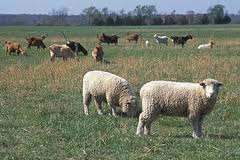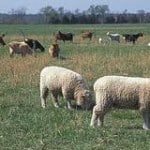Sheep and Oxen
Moshe Kempinski
Every event and challenge in the life journey of Yaacov ( Jacob) represents another rung in his ascent up the ladder to the heavens. He escapes the evil plans of his brother. He leaves his parents under the cloud of uncertainty and a sense of unworthiness. He escapes into a land clouded and unknown. He learns to cope with the camouflaged schemes of his uncle Lavan. He learns to balance the tensions of his growing family. He builds his material strength and possessions and then must flee from his uncle on his way home
It is then,too, that he must face his brother Esav. Would that be a challenge that will prove too much for him? The two brothers are not evenly matched. “And the youths grew up, and Esav was a man who understood hunting, a man of the field, whereas Yaacov was an innocent man, dwelling in tents. (Genesis 25:27).
Yaacov then prepares for the encounter in three ways. Rashi explains” He (Yaacov) prepared himself for three things: for a gift, for war, and for prayer. For a gift as the verse says (ibid: 22): “So the gift passed on before him.” For prayer as the verse says (ibid: 10): “God of my father Abraham…” For war, as the verse says : “the remaining camp will escape.”
Yet in his prayer Yaacov reveals his fears and insecurity ; “ I have become small from all the kindnesses and from all the truth that You have rendered Your servant, for with my staff I crossed this Jordan, and now I have become two camps.( ibid 32:11). That is to say Yaacov is declaring with the words “I have become small from all the kindnesses “that perhaps his merits have diminished because of the kindnesses and the truth that G-d has already rendered him.
Yet Yaacov moves forward. The Lubavitcher Rebbe in Likutei Sichos on this Torah portion , points to an interesting anomaly. When the Torah describes the wealth that Yaacov has amassed during his time with Lavan, it describes the growing herd of sheep that he has gathered. Yet in our Torah portion we read ” And he commanded them, saying, “So shall you say to my master to Esau, ‘Thus said your servant Jacob, “I have sojourned with Laban, and I have tarried until now And I have acquired oxen and donkeys, flocks, manservants, and maidservants, and I have sent to tell [this] to my master, to find favor in your eyes.'( ibid 32:5-6).
What happened to the sheep ,asks the Rebbe? Why does he tell Esav about the oxen and the donkeys and omits his miraculously achieved flock of sheep.
All the forefathers were shepherds. As were Moses and King David. There is much to be learn about faith from the sheep, as the psalms say “Know that Hashem, He is G-d! It is he who made us, and we are his; we are his people, and the sheep of his pasture. ( Psalms 100:3). As Yaacov’s relationship with G-d grew ,so did his preoccupation with the tending of his flocks of sheep. It is in that involvement he learns about reliance, obedience and the faith to follow his Shepherd into unknown pastures.
Yet when facing Esav he would have to develop new talents. The talents of the ox are more aggressive and powerful. As the tribe of Joseph is blessed by Moses “A firstborn bull—he has majesty,and his horns are the horns of a wild ox; with them he shall gore the peoples ( the enemies) ,all of them, to the ends of the earth; (Deuteronomy 33:17).This may be the deeper meaning of Yitzchak’s ( Isaac’s ) statement” “The voice is the voice of Yaacov , but the hands are the hands of Esav.'”( Genesis 27:22).
The Lubavitcher Rebbe concludes that when relating with G-d we must attain the attributes of the sheep. Yet when confronting the enemies of our people we must come with the power and determination of the oxen.
Regrettably in our days we see the leadership of the world becoming timid like sheep when confronting evil. That same leadership may deal with the faithful and friends in an arrogant and an “Ox-like” manner . When dealing with a powerful and significant enemy they revert to appeasement and fear.
This is not only foolish, it is suicidal. May Hashem give them and our own leadership the vision to see what is before us and the wisdom to know how to contend with it.

